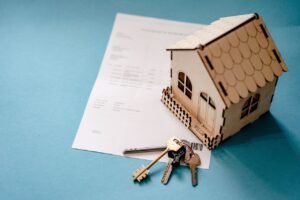Are you a landlord trying to understand the new rules on property upkeep? The Fitness for Human Habitation Act is key. It’s been in place since 20 March 2019 in England. This guide aims to clarify what you need to do. It ensures your properties are up to standard.
Now, landlords must make sure their properties are fit to live in. This responsibility kicks in at the start and continues throughout each tenancy. It doesn’t matter if it’s in the social or private sector. The rule covers any tenancy of less than 7 years.
It’s vital to follow the fitness for human habitation guidelines. This helps keep your properties in shape and steer clear of legal troubles. You’ll need to tackle issues like damp, mould, and heating. Your maintenance tasks play a huge part in upholding these standards.
Key Takeaways
- The Fitness for Human Habitation Act came into force on 20 March 2019
- Landlords must ensure properties are fit for habitation throughout tenancies
- The Act applies to both social and private rented sectors
- Regular property maintenance is essential for legal compliance
- Failure to meet standards can result in legal action from tenants
Introduction to the Fitness for Human Habitation Act
The Fitness for Human Habitation Act is a key step to make homes safer and better across England. It gives tenants more power and tells landlords what they must do to keep their homes safe.
Overview of the legislation
It says that every rented home must be safe to live in. This includes making sure the building is sound, there’s no damp, there’s enough light and air, and more. Landlords have to provide homes that have safe water, are clean, and have no pests.
When the Act came into force
It started on 20 March 2019. If someone signed a new lease then or later, the Act would help them from the start. For those already renting, it began to protect them from 20 March 2020.

Objectives of the Act
This law is here to make sure rented homes are safe and meet basic standards. It also wants to make sure landlords do their part. They should keep their properties in good condition and prevent hazards.
The Act wants to improve the rental market for everyone. It gives tenants more rights and helps local authorities. By doing this, it also supports other safety rules, like checking electrical systems every five years and gas systems every year.
Understanding Landlord Responsibilities
Being a landlord in the UK means you must make sure your property is up to legal standards. It should be a safe place for people to live. The law called the Fitness for Human Habitation Act, started in March 2019, clearly states what you need to do. This is about keeping the place safe and looking after your tenants.
You need to ensure the home is fit to live in for tenants all the time. This includes things like making sure the building is in good shape outside. It also means checking the important service systems work well. Here are your main jobs:
- Maintain the building’s structure and exterior
- Keep drains, gutters, and external pipes in good condition
- Ensure proper functioning of water, gas, and electricity systems
- Maintain sanitation facilities
- Provide adequate heating systems
Making sure you follow the law is crucial. The Renting Homes (Fitness for Human Habitation) (Wales) Regulations 2022 cover 29 things to check. This list helps to make sure the place is good for living in. It includes things like avoiding damp and keeping the temperature right.
- Damp and mould growth prevention
- Proper indoor temperature control
- Adequate ventilation
To keep up with these standards, use things like good drainage and making sure the air flows well. Deal with cold problems by putting in good insulation and heating.
Don’t forget your duty reaches to shared areas in the building if there are more than one home. Not doing what you should can lead to trouble and fines. Being on top of looking after the property keeps everyone safe and happy. It also stops problems with your tenants.
| Responsibility | Action Required | Frequency |
|---|---|---|
| Structural maintenance | Inspect and repair walls, roof, and foundation | Annually |
| Plumbing system | Check for leaks and ensure proper drainage | Bi-annually |
| Electrical safety | Conduct EICR (Electrical Installation Condition Report) | Every 5 years |
| Gas safety | Arrange gas safety inspection | Annually |
| Energy efficiency | Update EPC (Energy Performance Certificate) | Every 10 years |
By doing these things, you meet your legal duties and keep a good relationship with your tenants. This could make your property more valuable. It also helps to get trustworthy, long-term tenants.
UK landlords should understand the Fitness for Human Habitation Act well. This law started on 20 March 2019 to lift housing standards in England. We’ll look at the must-knows for landlords.
Key Criteria for Fitness
This Act lists what makes a place fit for living. It looks into things like:
- Building stability
- Freedom from damp
- Adequate natural light
- Proper ventilation
- Safe water supply
- Functional drainage systems
- Suitable sanitary conveniences
Landlords have to make sure their properties fit these standards. That way, they lower their own risks.
Assessing Property Condition
Keeping an eye on your property is key. Here’s what you need to do:
- Check your place well twice a year
- Take pictures and notes on its state
- Fix any problems fast, especially on safety matters
- Keep a neat record of maintenance and repairs
Preventative Measures
Getting ahead of issues is smart and saves you trouble later. Here are ways to do that:
| Area | Preventative Action | Benefit |
|---|---|---|
| External Fabric | Keep roof, walls, and gutters well maintained | Less water damage and problems |
| Ventilation | Set up and look after ventilation well | Less mould and damp |
| Heating | Have good heating systems that work | Makes the place comfy and stops damp |
| Plumbing | Check pipes often and fix leaks quick | No water issues or mould to deal with |
Looking after these spots helps keep quality high and trouble low. Always aim to do maintenance work before it’s needed. This is important under the Fitness for Human Habitation Act.
Scope of the Act: Which Properties Are Affected?
The Fitness for Human Habitation Act in England covers a lot of ground. Its goal is to make rented homes safer and legally sound. Starting from 20 March 2019, it covers most rental types and lengths.
- Tenancies shorter than 7 years granted on or after 20 March 2019
- New secure, assured, and introductory tenancies
- Tenancies renewed for a fixed term
- All periodic tenancies from 20 March 2020
This law isn’t just for new rentals. If you’re already renting a property, you must meet its standards for maintenance and safety.
Since 1965, the Law Commission has been key in creating these rules. They stated the landlord’s duties in a 1992 paper (No. 123) about property conditions.
| Tenancy Type | Applicability Date |
|---|---|
| New tenancies under 7 years | 20 March 2019 |
| Renewed fixed-term tenancies | 20 March 2019 |
| All periodic tenancies | 20 March 2020 |
Though the Act is wide-reaching, there are some exclusions. Issues due to tenants, natural disasters, or their belongings are not on the landlord. If getting permission for certain work is impossible, the Act might not apply in some cases.
Knowing and following these rules is your best bet. Regular checks and fixing problems early can keep you and your tenants safe. It also helps you avoid fines under the Act.
Identifying and Addressing Common Hazards
For UK landlords, keeping properties safe is vital. The Fitness for Human Habitation Act started on 20 March 2019. It tells us how to deal with dangers in rental homes.
Damp and Mould Growth
Dampness and mould are bad for our health. They can harm breathing and lungs, especially for kids and older folks. Here’s what you can do:
- Make sure all rooms have good airflow
- Fix water leaks right away
- Put in place measures to stop damp
- Check often, especially places with more risks like bathrooms
If you see mould, just cleaning it may not be enough. You have to fix the damp too.
Cold and Heat Issues
Too cold or too hot can affect how comfortable and healthy your tenants are. Here’s how you can help:
- Give them good heating systems
- Make their homes better insulated
- Use windows that keep the heat inside
- Keep the air moving to stop it getting too hot
Structural Problems
If a home’s structure is weak, it’s not safe. Keeping up with repairs stops big issues before they start. Do these things regularly:
- Check the structure yearly
- Fix signs of the house sinking quickly
- Mend leaky roofs and gutters to stop water coming in
- Make sure all the parts holding up the house are strong
Landlords should put safety first. Doing these checks and acting fast on tenant worries is key. It helps keep homes good to live in and follows the law.
Landlord’s Obligation to Keep Dwellings in Repair
In the UK, being a landlord means you must keep your properties well-maintained. This rule comes from Section 11 of the Landlord and Tenant Act 1985. It says you must look after your properties and make sure they are safe to live in.
There are several things you have to do as a landlord. They include keeping the building’s structure and outside in good condition. You must also make sure the water, gas, and electricity work. Plus, heating and plumbing systems need to be up to scratch.
Remember, these duties last for the whole time someone lives in your property. When you know something needs fixing, you should sort it out quickly.
- Look around the property often, maybe every 3 to 6 months.
- Fix things for your tenants quickly when they ask.
- Get someone to check the gas safety every year.
- Check the electrical systems every five years.
- Keep good records of all the maintenance work.
Trying to avoid these repairs or making your tenants do them is not allowed. It’s best to take a hands-on approach to maintenance. This will keep your tenants happy and safe, and you’ll be meeting your legal duties.
Since March 20th, 2020, a rule for most homes in England is that they must be fit to live in. This makes it even more vital to keep your rental properties in top condition.
Tenant Rights and Responsibilities Under the Act
The Fitness for Human Habitation Act grants tenants important rights. It also shows their duties. This makes sure that tenants are safe and follow the law in UK rentals.
Reporting Issues to Landlords
Tenants play a key part in keeping the home safe. They should report any problems quickly. Every tenant has the right to a safe home with basic features. Landlords should fix problems like no heating within 24 hours.
To report problems:
- Document the issue with photos or videos
- Inform your landlord in writing, keeping a copy for your records
- Allow reasonable access for inspections and repairs
Tenant-Caused Problems
Tenants should use the property carefully. They must:
- Keep the place neat and clean
- Use the fixtures and fittings correctly
- Tell the landlord about any fixes needed
- Not damage the property more than normal use would
Landlords are not responsible for problems from tenant actions or things. If you cause damage, you might have to pay for repairing it.
Knowing your rights and duties keeps things good between you and your landlord. If there’s a problem, try talking it out or use mediation. Working together ensures the property is safe and meets UK housing rules.
Legal Implications and Potential Penalties
The Fitness for Human Habitation Act greatly impacts landlords in the UK. Not following this law can have serious effects, such as fines and harm to a landlord’s name.
If a court decides a home isn’t fit to live in, they can make the landlord fix it. Landlords might have to pay a lot to make their homes better. Also, tenants might get money depending on how bad the issue is and how it affected them.
- Do regular checks on their properties
- Fix problems quickly
- Keep a record of all fixes and updates
- Listen to tenants and deal with their complaints fast
- Stay updated on housing laws
The price of not sticking to the rules can hit hard. For example, breaking energy efficiency laws might lead to fines of £5,000 per home. More serious or repeated issues can bring even larger fines or jail time.
It’s key for landlords to know about over 170 rules regarding rented housing. Being up-to-date with these laws is vital for staying out of trouble and keeping a good image in the rental market.
By putting property care and tenant safety first, landlords can avoid a lot of legal stress. This not only saves them from big fines but also makes the renting experience better for tenants.
Preventative Maintenance and Property Inspections
Keeping your property in good shape is key for landlords. Regular checks help avoid problems and keep it safe for living. This saves money on repairs later.
Regular Inspection Schedules
Having a set time to check your property is vital. Try to look around at least twice yearly. It’s also smart to inspect it more closely in between tenants. Look for:
- Signs of damp or mould growth
- Structural integrity of walls, floors, and ceilings
- Proper functioning of heating and ventilation systems
- Condition of windows and doors
- State of electrical installations and appliances
Always give your tenants 24 hours’ heads up before entering for checks. Giving them a checklist can help too. It asks them to let you know about any problems quickly.
Documenting Property Condition
Keeping good records of your property’s state is crucial. Make detailed reports every time you check it. Include things like:
- Date and time of inspection
- Photographs of each room and any areas of concern
- Notes on the condition of fixtures, fittings, and appliances
- Any maintenance work carried out or required
- Tenant feedback or concerns
It’s important to keep these reports safe. They show you take property upkeep seriously. They can also help in any disagreements with tenants or officials.
Regular maintenance and checks are essential for landlords. They make sure the property is safe and in good condition. This is key for keeping good tenants and protecting your property.
Addressing Fitness Issues in Different Property Types
Landlords have to deal with different challenges depending on the property type. Knowing these differences is key to keeping up fitness standards and keeping tenants safe.
Flats and Houses in Multiple Occupation (HMOs) need extra attention for their communal areas and shared facilities. Landlords in these places must make sure:
- Shared spaces get cleaned regularly
- Appliances in common areas are maintained
- Fire safety is up to scratch
- Noise doesn’t travel too much between units
Older properties might have issues like outdated systems and not-so-great insulation. To keep up with the standards, landlords ought to think about:
- Making heating systems more energy efficient
- Adding better insulation to walls, roofs, and windows
- Dealing with damp and drafts
- Updating the electrical wiring for safety
Newer buildings usually meet today’s standards better but often have ventilation issues. Landlords in these cases should:
- Make sure ventilation systems are installed and work well
- Teach tenants how to avoid condensation and mould
- Check the premises for any upcoming problems regularly
The table below shows common fitness problems and how to deal with them in each property type:
| Property Type | Common Issues | Recommended Actions |
|---|---|---|
| Flats/HMOs | Shared facility maintenance, fire safety | Regular inspections, clear responsibility agreements |
| Older Properties | Poor insulation, outdated systems | Energy efficiency upgrades, system modernisation |
| Newer Builds | Ventilation problems, condensation | Proper system maintenance, tenant education |
By tackling these important issues, landlords can make sure their properties are up to standard. This keeps tenants safe, maintains the property’s value, and meets legal rules.
Working with Local Authorities and Housing Standards
Local authorities are crucial for keeping housing standards high and legal in the UK. They help landlords and tenants stay safe.
Landlords must know the local housing rules. The Housing Act 2004 made big changes to housing rules nationwide. Here’s what you need to remember:
- Local councils check what housing is needed in their area
- The old housing standard was replaced by the Housing Health and Safety system
- Special licenses were needed for Houses in Multiple Occupation (HMOs)
- Some areas must have a special license to fight bad housing and anti-social problems
Local authorities work hard to keep housing good. If your place doesn’t meet the rules, you could be fined. Check out these facts:
- 14% of UK homes for rent are not up to the ‘Decent Homes Standard’
- 10% of rented homes have serious safety risks
- Nearly half of tenants have bad repair problems
It’s best to fix problems before they happen. Your local council can help you upgrade your property. In England, the Homes Act says homes for rent must be safe and healthy.
| Common Disrepair Issues | Percentage of Tenants Affected |
|---|---|
| Mould | 48% |
| Damp | 47% |
| Entrance defects | 29% |
| Roof leaks | 26% |
| Water leaks | 26% |
By keeping up with council rules and working together, your properties will be safe and legal. Your tenants will have great places to live in.
Conclusion
The Fitness for Human Habitation Act has changed how landlords work in the UK. It started on 20 March 2019 and covers any home rented for seven years or less. This law focuses on making sure homes are safe and healthy for renters.
It’s important for landlords to know and follow this act. Past legal cases show that issues like bugs or poor ventilation can make a home unsuitable. To keep houses in good shape, regular upkeep is essential.
Landlords should look for and fix problems ahead of time. The 2011 House Condition Survey found that Northern Ireland needed £1.6 billion to fix homes. By being proactive and doing regular checks, you can save money and avoid legal trouble. Remember, the goal of the Act is to raise living standards, which benefits everyone.





